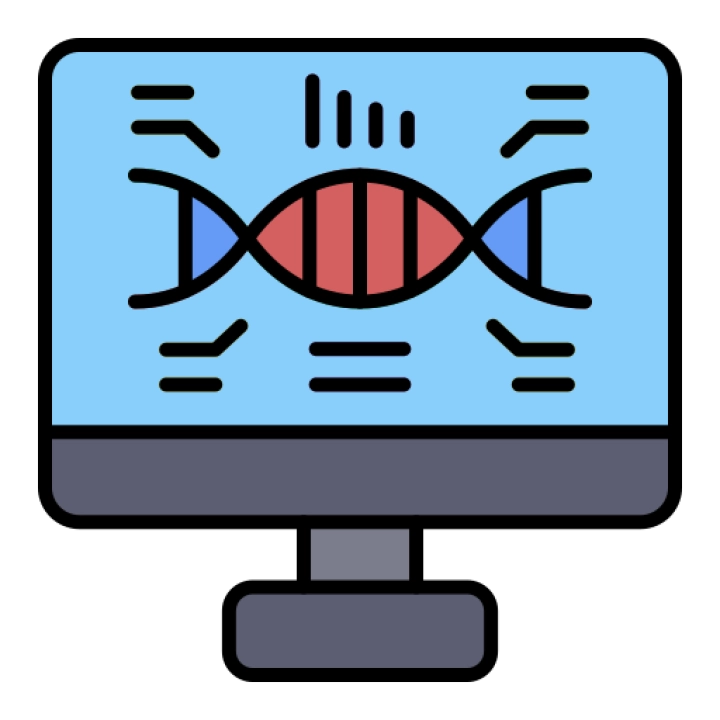College: Institute of Sciences
This specialization prepares students for work in bioinformatics, focusing on the application of computational tools and techniques to understand and analyze biological data. Students develop practical skills in data analysis, programming, and biological databases, alongside theoretical knowledge in genomics, proteins, and systems biology. Graduates are prepared for roles in research institutions, biotechnology companies, pharmaceutical industries, and healthcare organizations.
Learning Objectives:
- Understand the fundamentals of bioinformatics, genomics, and computational biology.
- Develop skills in data analysis, programming, and managing biological databases.
- Learn genome sequencing techniques, protein structure prediction, and systems biology.
- Explore the principles of machine learning, data visualization, and statistical analysis in bioinformatics.
- Analyze challenges and opportunities in analyzing and interpreting biological data.
- Develop critical thinking, problem-solving, and analytical skills for bioinformatics research.
Main Syllabus:
- Introduction to Bioinformatics
- Overview of key concepts and industry trends in bioinformatics.
- Basics of bioinformatics, genomics, and computational biology.
- Genomics and Proteins
- Principles of genomics and proteins.
- Genome sequencing techniques, gene expression analysis, and protein structure prediction.
- Biological Databases
- Essentials of biological databases and data management.
- Techniques for accessing, querying, and integrating biological databases.
- Programming in Bioinformatics
- Principles of programming languages commonly used in bioinformatics.
- Techniques for developing bioinformatics tools and algorithms.
- Data Analysis and Statistics
- Principles of statistical analysis and data visualization in bioinformatics.
- Techniques for analyzing and interpreting biological data.
- Machine Learning in Bioinformatics
- Fundamentals of machine learning and its applications in bioinformatics.
- Techniques for implementing machine learning algorithms for biological data analysis.
- Systems Biology
- Principles of systems biology and network analysis.
- Techniques for modeling and analyzing biological systems and networks.
- Bioinformatics Practical Training
- Real-world bioinformatics experiences, including observations, internships, and hands-on projects in research or industrial settings.
- Applying acquired skills in practical bioinformatics scenarios.
- Bioinformatics Graduation Project
- A comprehensive project applying skills in genomics, data analysis, or systems biology.
- Presenting a polished research project or case study in bioinformatics.
Assessment Methods:
- Reports on genomic analysis, protein structure predictions, biological database projects, programming assignments, data analysis presentations, machine learning projects, systems biology models, practical training reports, graduation projects, group projects, and internship evaluations.
Recommended Textbooks:
- "Bioinformatics: Sequence and Genome Analysis" by David W. Mount.
- "Genomes" by T.A. Brown.
- "Biological Databases" by Michael Ashburner and Ewan Birney.
- "Python for Bioinformatics" by Sebastian Bassi.
- "Statistics for Bioinformatics" by Michael O. Dixon and John M. Dixon.
- "Machine Learning for Bioinformatics" by Jason H. Moore and May D. Wang.
- "System Biology: A Text Book" by Edda Klipp et al.
Prerequisites:
Basic knowledge of biology, computer science, and statistics. Suitable for students interested in bioinformatics, genomics, computational biology, and related fields.
Duration of Specialization:
Typically 4 years for a bachelor's degree, including coursework, projects, practical training, and internships.
Certification:
Graduates can earn a degree in bioinformatics and pursue professional certifications or additional education in related fields, such as a master's degree in bioinformatics, computational biology, or data science.
Target Audience:
Aspiring bioinformaticians, computational biologists, data scientists, and individuals seeking careers in bioinformatics, genomics, biotechnology, pharmaceuticals, and related fields. This specialization equips students with the practical, theoretical, and analytical skills needed to excel in bioinformatics, supporting careers in research, biotechnology, pharma, and healthcare.

